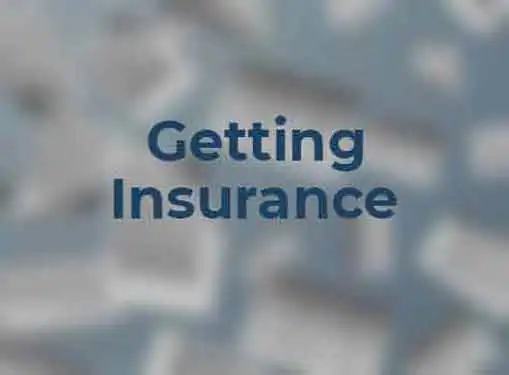Small Business Insurance FAQ
Getting Insurance for Your Small Business
Operating a business is difficult enough without having to be concerned about suffering significant financial loss, or worse, due to unforeseen events occurring. Insurance is to protect against loss of your investment and financial impairment to your business.
Some of the most commonly asked questions regarding commercial insurance are discussed below:

Q. How do I go about obtaining business insurance?
A. The first step in obtaining proper business insurance is to find and contact a reliable insurance agent or broker. Business contacts can often refer you to someone that they have had good experience with. When looking through the yellow pages, look for specialization in commercial insurance, and membership in one of the professional agents or brokers associations. When dealing with the agent initially, they should do their own analysis or survey of your exposures, and then ask to review any present coverages. To do otherwise could perpetuate any errors, gaps or overlaps that may exist in your present program.
Q. What kind of insurance do I need?
A. There are six broad areas of exposure:
- Property
- Time Element
- Crime
- Automobile
- Liability
- Workers' Compensation
Not every business will have exposures in every area, which is why an analysis must be done. The State requires Workers Compensation insurance if there are any employees. Various governmental agencies may require certain types of insurance. For example, the Contractors State License Board requires bonds for contractors, and the Public Utilities Commission requires Commercial Automobile insurance. Most other insurance is a business decision on your part. However, contracts you may enter into, such as leases, loans, etc., may contain insurance requirements you have to comply with, and of which you should be aware.
Q. Can any exposures be reduced or eliminated?
A. You can order an inspection by a Loss Control Engineer to uncover hazardous conditions. Recommendations from this report can benefit you by helping to reduce premiums and making your business more attractive to insurers.
Q. What are some of the specific exposures and how are they covered?
A. Following is a table of common exposures and appropriate coverages:
PROPERTY
Exposure
Coverage
(a) Lessee required to provide insurance.
(a) Common Carrier
TIME ELEMENT
Exposure
Coverage
CRIME
Exposure
Coverage
COMMERCIAL AUTO
Exposure
Coverage
LIABILITY
Exposure
Coverage
Q. In Commercial Insurance, are there policies that provide or combine the various kinds of coverages like a Homeowners policy does with personal insurance?
A. Yes there are various "package" policies available. Programs such as the Business Owners Policy (BOP), Special MultiPeril (SMP) and insurance company designed packages are constantly being marketed. Many insurers design packages to meet specialized needs. Such as Auto Garages, Auto Dealers, Jewelers, Furriers, Barbers and Beauty Salons, and Apartment Buildings. Competent Commercial Agents and Brokers are prepared to offer these programs.
Q. Can I obtain Earthquake insurance for a business?
A. The insurance companies are not required to offer earthquake insurance on commercial property. The availability is therefore determined by the market place and individual company underwriting decisions. Here again, the agent can do the searching for you.
Q. How much does business insurance cost?
A. Your cost will be unique to your exposure; that is, it will be similar risks insured by the same company, but since this is a competitive market, different companies will have different premiums. You should know the basis for the premiums. Property insurance premiums are based on a rate per $100 coverage. Factors that go into making the rate are construction of building, occupancy and use, public protection, neighboring exposures and internal protection, such as sprinklers, etc.
The premium basis for liability insurance depends on the type of business. Stores and manufacturing are based on gross sales. Contracting and service businesses are based on payroll. Apartments are based on the number of units, hotels, on gross sales, and office space and property owned and leased to others are based on square footage area.
Anything based on sales or payroll is auditable and can result in additional or return premium. Companies have minimum and deposit premium requirements, which can and do vary, and should be considered when shopping.
Q. How can I find out about insurance companies that are presented to me?
A. First, ask the agent for background on the company. Then call the Department of Insurance for your state to find out status in your state, how long in the state etc. You may then want to go to the library and obtain detailed financial information and ratings by reviewing rating service reports published by A.M. Best, Standard & Poors, Moodys or other rating services.
Q. After I agree to purchase insurance, complete the applications and pay money, how do I know I have insurance?
A. You should be given a "binder" signed by the agent, showing you as the insured, effective date of coverage, the insurance company, location and description of property insured, amounts of coverage, limits of liability and other pertinent information. A binder may be valid for up to 90 days pending issuance of the policy.
Q. Can an insurance company cancel my insurance?
A. A company has a 60 day underwriting period, during which they review the application and other information submitted, possibly have an inspection done, and verify the rating and premium calculation. The company may cancel your insurance within that 60day period. They must give you at least 10 days notice of cancellation.
After 60 days, the reasons a policy may be cancelled are very limited. The reason and a 30 day notice must be given. When the reason is nonpayment of premium or fraud, 10 days notice is required.
Q. When I receive my policy(s), how can I be sure they contain what I agreed to?
A. Ask your agent to deliver the policy(s) in person, review them with you and answer any questions you might have.
Q. How would I know if the insurance company is not renewing my insurance?
A. The insurance company must give at least 60 days, but not more than 120 days notice of nonrenewal, and the reasons.
Share this article
Additional Resources for Entrepreneurs




Conversation Board
We greatly appreciate any advice you can provide on this topic. Please contribute your insights on this topic so others can benefit.